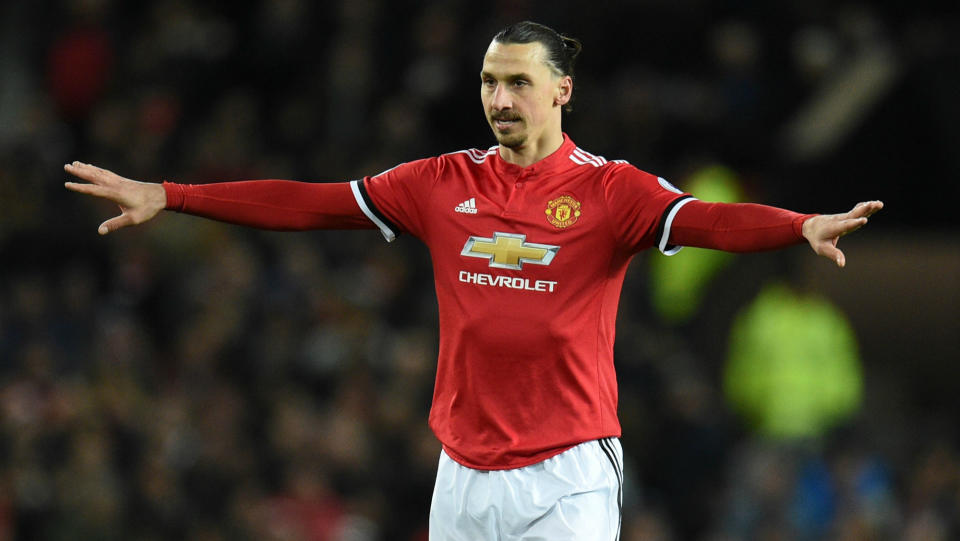Can Romelu Lukaku and Zlatan Ibrahimovic co-exist at Manchester United?

Some would say it is a nice problem to have. Jose Mourinho argued it is not a problem at all. Can Romelu Lukaku and Zlatan Ibrahimovic co-exist and combine in the same Manchester United side, he was asked on Friday? Simple, he replied: “Good players can play together. It’s easy to play together.”
A headline statement did not contain specifics. The dilemma for Mourinho now is therefore not how they play together, but when and where and how. Lukaku is his top scorer this season, the costliest striker in United’s history and the future of their forward line for years. Ibrahimovic was his top scorer last season, is the most prolific out-and-out striker of his generation and a man approaching 500 career goals for club and country. They are both accustomed to leading the line.
In theory, they could be the most towering attacking duo in England since Ian Ormondroyd and Ian Olney were twinned at Aston Villa by Graham Taylor. In reality, they have a manager with an aversion to strike partnerships.
Mourinho won the 2004 Champions League with twin forwards, in Derlei and Carlos Alberto, but abandoned a policy of picking a front duo and a midfield diamond weeks into his first spell at Chelsea. It was only revived, seemingly against his will, when Roman Abramovich bought Andriy Shevchenko and he already had Didier Drogba.
READ MORE: Conte’s reason for Chelsea’s return to form
READ MORE: Who could replace Pulis at West Brom?
But he has spent the last 13 years almost exclusively playing 4-3-3 or 4-2-3-1, with one out-and-out striker, one target man and one attacking talisman, not two. His teams have often been defined by that lone frontrunner, whether Drogba, Ibrahimovic, Diego Milito or Diego Costa. There has been the sense a supposed ally would get in their way, rather than equating to double trouble for opposing defences.
Ibrahimovic offered a solution last week. He has already changed shirt number to accommodate the newcomer. He indicated he could switch position as well. “To me, No. 10 is the star,” said a man with a keen interest in stardom. It would appeal to his ego to be the creator in chief. He has played the deeper role for Sweden, albeit in a much less talented team where others did his running. It would mean Lukaku could still stretch defences with the pace that has given United another dimension and allow Mourinho to cram yet another six-footer into his supersized team.
Given Henrikh Mkhitaryan’s loss of form, it could be a short-term solution. Juan Mata began in the central attacking berth behind Lukaku against Newcastle, but Mourinho has rarely allowed the Spaniard his preferred role, whether for Chelsea or United. Ibrahimovic has been a disciple of the Portuguese’s in a way Mata has not. Equally Mourinho’s No. 10s tend to be genuine playmakers, like Deco, Wesley Sneijder and Mesut Ozil, not converted strikers. They usually have defensive duties; the need for them to be the fifth midfielder off the ball makes Ibrahimovic an imperfect fit.

So it was instructive that, in his cameo against Newcastle, Ibrahimovic came on as a striker and Lukaku switched to the right. It may be an exaggeration to call it United’s problem position; it would be more accurate to say it is no one’s favourite spot.
It is not entirely alien territory for Lukaku. Roberto Martinez fooled Arsenal by fielding him on the right flank to great effect in a 3-0 win in 2014. It would not be an unknown move for Mourinho: he used Samuel Eto’o as a right winger when Inter won the Champions League in 2010. One of the most feared forwards of his time took his reinvention so seriously he seemed an auxiliary right-back at times.
READ MORE: Rashford’s surprising choice for a football idol
READ MORE: Arsenal’s joy shows how far they’ve fallen
And yet, though Lukaku has provided some fine crosses from the right – think of Marcus Rashford’s goal at Huddersfield – it would seem a waste of a £75 million striker to pick him on the flank. Johan Cruyff used Gary Lineker as a winger, but Mourinho operates more on logic than dogma.
The other option, one which a devotee of a back four has experimented with, is to use 3-5-2 more regularly. United have natural wing-backs, in Ashley Young and Antonio Valencia. But if Ibrahimovic and Lukaku were paired, that would entail abandoning the job-share between Anthony Martial and Marcus Rashford and benching both.

In short, there is no easy way to choose both Lukaku and Ibrahimovic without it coming at a cost to, whether to the Belgian or the Swede, Mkhitaryan or Mata, Martial or Rashford. The simpler conclusion, but the one he cannot admit, is that Ibrahimovic was brought back to understudy Lukaku for much of the time.
There is a logic to it: Mourinho overplayed the veteran last season, perhaps indirectly leading to his cruciate ligament injury, and Lukaku has never experienced a 60-game season as the main man in attack; should he have another dip in form, as he did in October, Ibrahimovic can stand in. But calling him a deputy would not be diplomatic. Instead, there is the occasional compromise when neither is rested and both are on the pitch, a few awkward decisions in selection and moments when Mourinho has to inform either he is not playing. A supposedly easy situation threatens to have plenty of difficulties.


